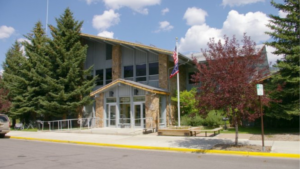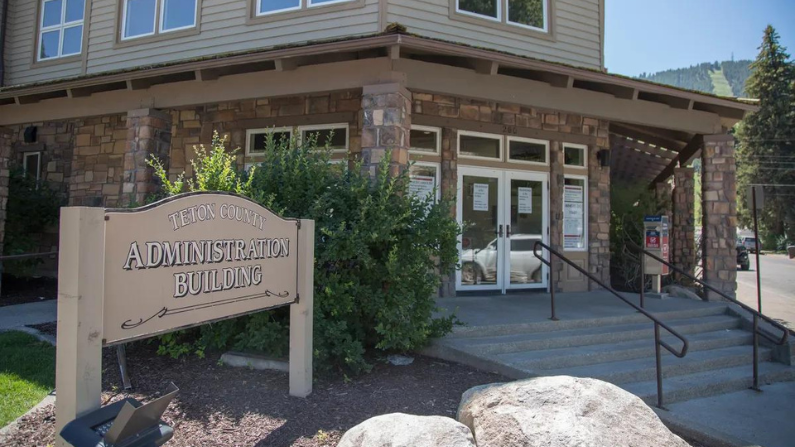Town councilor Jim Rooks leaned a black e-bike with a political yard sign fastened to the back onto its kickstand in the lawn outside the Town Hall. On the sign, a colorful trout framing his campaign slogan in big bold block letters “Unity in the Community.”

Town council member Jim Rooks is running for a Town Commissioner spot this election cycle. (Dante Filpula Ankney / KHOL)
“And I mean it because the best thing we could do is to get along on a local basis and pool our funds and cooperate as much as possible,” Rooks said. “The worst thing we could do in the midst of these challenges is to not get along.”
Rooks is one of five candidates vying for two open seats on the Teton County Board of Commissioners ahead of August’s primary.
The slogan is a familiar mantra with similar iterations echoed among town and county electeds to stress the ideals of cooperation and compromise between the two governing bodies.
But whether they’re actually doing that?
“Sometimes. It’s not horrible,” Rooks said. “And there’s a lot of good stuff to report, but I’m very clear in suggesting that we absolutely could get along better.”
There have been pointed jabs, flaring tempers and visible frustrations between local electeds at multiple meetings recently discussing a new “Memorandum of Understanding” or MOU that outlines a new split of costs for joint services like START, Fire/EMS and Parks and Recreation.
But both sides did eventually come to a tentative agreement during two different meetings in early July despite some reservations from some town councilors. In part, because they have serious budget issues. They’re operating at a deficit and have been digging into reserves to break even. They face an about $4 million dollar budget cliff in the coming years, meaning they’ll go bankrupt, if changes aren’t made.
Town Councilor Jonathan Schechter voted for the MOU.
“Is this the best deal possible? Probably not,” Schechter said. “But is it progress in a direction we should be moving? Yes.”
The deal is that the County will pay 62% of expenses for joint services and the Town will pay 38%. Previously, the split was 54% with the County and 46% with the Town.
The new split could alleviate some budget pressure for the Town if it goes into effect.
But it’s is only phased in over several years if a Special Purpose Excise Tax or SPET ballot measure is passed by voters in November. And even then it won’t be enough. The Town is going to have to find new ways to balance their budget.
Jessica Sell-Chambers was the only Town councilor to not approve the MOU. She says the Town needs a different split to solve its budget woes and feels the Town was pressured into a decision by the County.
“I think it’s a shame that we are not being met equally as partners,” Sell Chambers said.
Some County Commissioners like Greg Epstein pushed back on this notion during discussions. They argued that the Town can solve its own budget issues in a variety of different ways and it’s unfair to place that responsibility on the County.
“You can act like the victim but you’re not,” Epstein said, “You guys have solutions, you have dials, you can turn and tweak things.”
There’s broad support for the SPET ballot measure among local electeds. The additional penny of sales tax would go towards a new building that would put the jail, the dispatch center and the courthouse under one roof. Town and County officials are planning a series of educational meetings for the public ahead of November.

Part of the SPET tax would aid in vast improvements to existing government buildings. (Wyoming County Commissioners Association)
They say the two current buildings housing the jail, dispatch and courthouse facilities are unfit for operations at best and unsafe at worst.
“It’s literally hundreds of different problems associated with both of these buildings,” Rooks said.
So due to the MOU agreement, when voters decide on SPET for a new building to house a justice center, they’re also deciding if they approve of a new split of costs for joint services.
“The people get to decide whether or not it’s the right deal for our community,” Rooks said.
The Town will go bankrupt in the coming years if changes like the split aren’t made. As the split is phased in across several years, it will relieve some of the Town’s budget pressures. But they’re still far from a sustainable budget.
Town Councilor Schechter says both governing bodies are stretched thin.
“We’re fighting for scraps because both the Town and the County are being asked by our constituents to do a lot more than we have money to do,” Schechter said.
So other changes outside the split will have to be made to balance the Town’s budget. Like raising taxes or imposing new ones. The Town has discussed raising its lodging tax, but it hasn’t gained steam in a community that many see as “taxed out.”
Another option is reducing or cutting services altogether. But, according to Rooks, there are no obvious cuts to what he sees as core services.
“And so, yes, this community has to understand that, budget cuts, I think, on some level are coming,” Rooks said. “And then the question is what to cut. I challenge anyone to walk in and look at our budget right now, and you point to the line and tell me what you’re going to cut. I’m not convinced there’s much of any fat on the bone left to cut.”

The need for budget cuts will continue to play out in Teton County moving into election season. (Flickr)
Rooks was on a special joint revenue committee with other Town and County electeds whose mission in part was to find solutions to this very issue, but nothing came of it.
“It’s not going to resolve itself instantly,” he said. “There’s no single thing that’s going to fix it.”
Regardless if the SPET measure passes and goes into effect, according to Rooks, taxes, cuts or a combination of both, are likely.
“I think it’s a harsh reality that this community is going to have to, and you could argue right now is already currently facing,” he said.
The SPET measure for the Teton County Justice Center that would enact the new split of costs for joint services between the Town and County will be on the ballot November 5.






